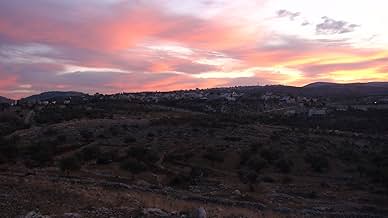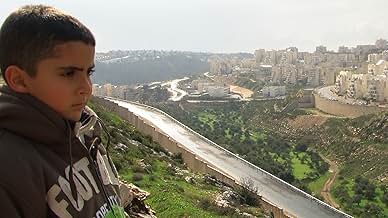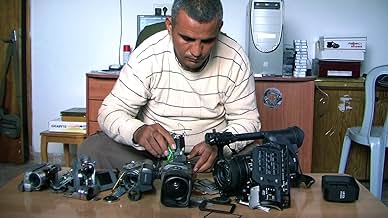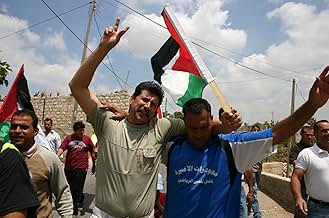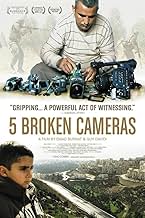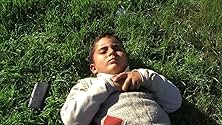VALUTAZIONE IMDb
7,9/10
6996
LA TUA VALUTAZIONE
Aggiungi una trama nella tua linguaA documentary on a Palestinian farmer's chronicle of his nonviolent resistance to the actions of the Israeli army.A documentary on a Palestinian farmer's chronicle of his nonviolent resistance to the actions of the Israeli army.A documentary on a Palestinian farmer's chronicle of his nonviolent resistance to the actions of the Israeli army.
- Candidato a 1 Oscar
- 18 vittorie e 10 candidature totali
Bassem Abu-Rahma
- Self - Protester
- (as Phil)
Ashraf Abu-Rahma
- Self - Protester
- (as Daba)
Recensioni in evidenza
It is rare to have something like this penetrate through the generally Zionist controlled media in the West. I am sure Zionists will try to label this film as "biased" and "one-sided," as usual in their intended distortion or paranoia. They might even start a campaign to lower its rating, as they normally do! But the facts and the images speak for themselves. Why is the world allowing the Israelis to get away with more land grabs and more injustice? The only reservation is that it does not explore fully the tragedy of what has been done to the Palestinians by Zionist colonization. This is not a special case. It is also similar to what happened in 1948 when almost 80% of Palestine was taken over, and the population in many cities and villages expelled and made into refugees. Hundreds of villages were ethnically cleansed, and several of them today have Israeli Jews living in the old houses owned by Palestinians (not having paid for them of course). It is almost like highway robbery. One film cannot do everything of course, but maybe it will encourages some people to dig more for the truth.
A personal and intimate portrait of the progressing encroaching of Palestinian land by the Israeli state and their Zionist cavaliers, is filmed over a period of several years. Starting in 2005, camera after camera, "5 Broken Cameras" is frank in its portraying of the startling injustice that has beholden an entire populace.
A clear indictment of Israel as a country as well as the crazy people who claim right to the land based on biblical scripture, the olive farmer Emad Burnat films his side of the story. Naturally one can claim bias, but truly the ongoings captured on tape by the cameraman cannot be exonerated or justified, nor do any of the films detractors manage to concoct any compelling counterarguments instead of the non-sensical 'Cry Wolf' tactic. Night raids on a village in order to arrest random children? Claiming land by appropriation? Burning down orchards of peaceful farmers? Shooting at children throwing stones? Army allowing settlers to attack unarmed peaceful protesters? Banning people from building structures on their own land? Widerspread harassment techniques to stop people from protesting? Throwing people out of their own house at night because its now a "Closed Military Zone"? Shooting a captured and restrained man at point blank range in the leg? Total disregard to their own court rulings? A sniper shooting a 11 year old boy in the head? And the best Israeli apologists can come up with is... but but but... they threw rocks.
A firm believer that somewhere along the road only a one-state non-religious democratic solution can avert a brutal war. The Zionists must accept that their inhumane treatment of the Palestinian people will have to end in bloodshed - be it theirs or the genocide of the Palestinian people. Only peaceful reconciliation inspired by the greats like Nelson Mandela can counter this inevitable tragedy. Unfortunately "5 Broken Cameras" leaves little space for hope...
"5 Broken Cameras" has left me mad and riled at the international community in general, which allows an apartheid state committing daily acts of ethnic cleansing through the use of force, appropriation of land and unjust racial policies to be a member of the international community. Despite governing a state that makes South Africa's apartheid look weak and crippled, Israel has yet to have any sanctions hit against it. Even worse - USA persists in funding the same army that is brutally encroaching human rights on a daily basis.
A clear indictment of Israel as a country as well as the crazy people who claim right to the land based on biblical scripture, the olive farmer Emad Burnat films his side of the story. Naturally one can claim bias, but truly the ongoings captured on tape by the cameraman cannot be exonerated or justified, nor do any of the films detractors manage to concoct any compelling counterarguments instead of the non-sensical 'Cry Wolf' tactic. Night raids on a village in order to arrest random children? Claiming land by appropriation? Burning down orchards of peaceful farmers? Shooting at children throwing stones? Army allowing settlers to attack unarmed peaceful protesters? Banning people from building structures on their own land? Widerspread harassment techniques to stop people from protesting? Throwing people out of their own house at night because its now a "Closed Military Zone"? Shooting a captured and restrained man at point blank range in the leg? Total disregard to their own court rulings? A sniper shooting a 11 year old boy in the head? And the best Israeli apologists can come up with is... but but but... they threw rocks.
A firm believer that somewhere along the road only a one-state non-religious democratic solution can avert a brutal war. The Zionists must accept that their inhumane treatment of the Palestinian people will have to end in bloodshed - be it theirs or the genocide of the Palestinian people. Only peaceful reconciliation inspired by the greats like Nelson Mandela can counter this inevitable tragedy. Unfortunately "5 Broken Cameras" leaves little space for hope...
"5 Broken Cameras" has left me mad and riled at the international community in general, which allows an apartheid state committing daily acts of ethnic cleansing through the use of force, appropriation of land and unjust racial policies to be a member of the international community. Despite governing a state that makes South Africa's apartheid look weak and crippled, Israel has yet to have any sanctions hit against it. Even worse - USA persists in funding the same army that is brutally encroaching human rights on a daily basis.
This document received so many Awards From Sundance festival to others, Can someone explain me why the hell every other movie on IMDb has Award section popping out immediately on a website but this movie NOT????
"5 Broken Cameras won the World Cinema Directing Award at the 2012 Sundance Film Festival. it won the 2013 International Emmy Award.The film also received the Special Broadcaster IDFA Audience Award and the Special Jury Award at the International Documentary Film Festival Amsterdam in 2011. In addition, the film won the Golden Apricot at the 2012 Yerevan International Film Festival, for Best Documentary Film, the Van Leer Group Foundation Award for Best Israeli Documentary at the Jerusalem Film Festival in 2012, and the Busan Cinephile Award at the 17th Busan International Film Festival in 2012. 5 Broken Cameras was nominated for Best Documentary Feature at the 85th Academy Awards Nominated for Best Documentary Feature in the 85th Academy Awards, and for the Asia Pacific Screen Award for Best Documentary of 2012...
"5 Broken Cameras won the World Cinema Directing Award at the 2012 Sundance Film Festival. it won the 2013 International Emmy Award.The film also received the Special Broadcaster IDFA Audience Award and the Special Jury Award at the International Documentary Film Festival Amsterdam in 2011. In addition, the film won the Golden Apricot at the 2012 Yerevan International Film Festival, for Best Documentary Film, the Van Leer Group Foundation Award for Best Israeli Documentary at the Jerusalem Film Festival in 2012, and the Busan Cinephile Award at the 17th Busan International Film Festival in 2012. 5 Broken Cameras was nominated for Best Documentary Feature at the 85th Academy Awards Nominated for Best Documentary Feature in the 85th Academy Awards, and for the Asia Pacific Screen Award for Best Documentary of 2012...
Emad Burnat's documentary about the on-the-ground reality for the people inside the West Bank is a very disturbing portrait of life under military occupation. In fact, when Burnat got detained at the LA airport on his way to the Academy Awards, he noted that it is what the Palestinians go through on a daily basis. Indeed, the settlers and army do some absolutely evil things, such as burning an olive tree.
"5 Broken Cameras" (whose title refers to the different cameras that Burnat had to use after the army kept breaking them) is a documentary that everyone should see. It's a real look at what life is like for the Palestinians under Israeli occupation, a complete contrast to the nonstop depictions of Palestinians as terrorists.
"5 Broken Cameras" (whose title refers to the different cameras that Burnat had to use after the army kept breaking them) is a documentary that everyone should see. It's a real look at what life is like for the Palestinians under Israeli occupation, a complete contrast to the nonstop depictions of Palestinians as terrorists.
Retributive Justice...Oh How Sweet It Is !!
Today, Sunday, February 24, 2013, the Oscars will be hosting this first ever Oscar nominated Palestinian documentary, whose content, we all know full well, will never be shared with the estimated one billion worldwide viewing audience, nor will it ever be permitted to win.
Nevertheless, it just happens to fall on the Jewish Holiday of Purim, which commemorates the deliverance of the Jewish people in ancient Persia, in the wake of a plot by Haman. It is a story recorded in the Biblical Book of Esther. Understandably, this day of deliverance has become a day of Jewish feasting and rejoicing. It is celebrated by the giving of mutual gifts of food and drink, the offering of charity to the poor, the consumption of a celebratory meal, and in addition to the prayers and the grace after the meals, there is often a public recitation of the Scroll of Esther. Other customs include the drinking of wine, the wearing of masks and costumes, as well as the exuberant display of celebrations in public. Like Hanukkah, Purim has more of a 'national' (Israel) than a 'religious' (Judaic) character, and its status as a holiday is on a lesser stature than those days ordained by the Torah. Accordingly, business transactions (including the Oscars), and even manual labor are allowed on Purim.
As early as the 5th century, there was a custom to "BURN AN EFFIGY" of Haman on Purim.
However, the first religious ceremony ordained in the celebration of Purim, is the reading of the Book of Esther (Megillah) in Synagogues. The Megillah is read with a scintillation (a traditional chant) differing from that used in the customary reading of the Torah. When Haman's name is read out during the public chanting of the Megillah in the Synagogues, which by the way occurs 54 times, the congregation engages in boisterous noise-making to "BLOT OUT THE NAME".
Over time, a custom developed of writing the name of Haman on two smooth stones, thereafter knocking them together until the name was blotted out. Others write the name of Haman on the soles of their shoes, and then at the mention of the name, loudly and repeatedly stomp their feet as a sign of contempt. Most though, employ the use a loud and noisy ratchet, called a ra'ashan, or in Yiddish a grager. Although some rabbis have protested against these uproarious excesses (raucous stomping and deafening ratcheting), considering them to be a disturbance of public worship, nevertheless, these two customs in particular, have continued to be universally carried out in almost all Synagogues on Purim.
Just a thought ?!
I wonder if during the Oscars, the Zionists of Hollywood plan to conduct an 'L.A. Festival of Burning', wherein all copies of the "Un-Israeli" film '5 Broken Cameras' will be incinerated, not unlike that conducted by the Nazis in May of 1933, during which upwards of 25,000 volumes of "Un-German" books (predominantly Jewish) were burned ?!
Or worse yet, publicly humiliate themselves during the announcement of the film's nomination for an Oscar award, by stomping their feet and twirling permitted Ra'ashans, in a feeble attempt to 'Blot It Out'?!
After all, just the other day, they did attempt to prevent the film-maker Emad Burnat, together with his wife and 8 year old son, from attending, by way of harassment and intimidation at the hands of Immigration Officials at L.A.X.
Perhaps, it was because a 'Film' or even a 'Broken Camera' in the hands of a Palestinian now constitutes a potential 'Terrorist Threat' ?!
Today, Sunday, February 24, 2013, the Oscars will be hosting this first ever Oscar nominated Palestinian documentary, whose content, we all know full well, will never be shared with the estimated one billion worldwide viewing audience, nor will it ever be permitted to win.
Nevertheless, it just happens to fall on the Jewish Holiday of Purim, which commemorates the deliverance of the Jewish people in ancient Persia, in the wake of a plot by Haman. It is a story recorded in the Biblical Book of Esther. Understandably, this day of deliverance has become a day of Jewish feasting and rejoicing. It is celebrated by the giving of mutual gifts of food and drink, the offering of charity to the poor, the consumption of a celebratory meal, and in addition to the prayers and the grace after the meals, there is often a public recitation of the Scroll of Esther. Other customs include the drinking of wine, the wearing of masks and costumes, as well as the exuberant display of celebrations in public. Like Hanukkah, Purim has more of a 'national' (Israel) than a 'religious' (Judaic) character, and its status as a holiday is on a lesser stature than those days ordained by the Torah. Accordingly, business transactions (including the Oscars), and even manual labor are allowed on Purim.
As early as the 5th century, there was a custom to "BURN AN EFFIGY" of Haman on Purim.
However, the first religious ceremony ordained in the celebration of Purim, is the reading of the Book of Esther (Megillah) in Synagogues. The Megillah is read with a scintillation (a traditional chant) differing from that used in the customary reading of the Torah. When Haman's name is read out during the public chanting of the Megillah in the Synagogues, which by the way occurs 54 times, the congregation engages in boisterous noise-making to "BLOT OUT THE NAME".
Over time, a custom developed of writing the name of Haman on two smooth stones, thereafter knocking them together until the name was blotted out. Others write the name of Haman on the soles of their shoes, and then at the mention of the name, loudly and repeatedly stomp their feet as a sign of contempt. Most though, employ the use a loud and noisy ratchet, called a ra'ashan, or in Yiddish a grager. Although some rabbis have protested against these uproarious excesses (raucous stomping and deafening ratcheting), considering them to be a disturbance of public worship, nevertheless, these two customs in particular, have continued to be universally carried out in almost all Synagogues on Purim.
Just a thought ?!
I wonder if during the Oscars, the Zionists of Hollywood plan to conduct an 'L.A. Festival of Burning', wherein all copies of the "Un-Israeli" film '5 Broken Cameras' will be incinerated, not unlike that conducted by the Nazis in May of 1933, during which upwards of 25,000 volumes of "Un-German" books (predominantly Jewish) were burned ?!
Or worse yet, publicly humiliate themselves during the announcement of the film's nomination for an Oscar award, by stomping their feet and twirling permitted Ra'ashans, in a feeble attempt to 'Blot It Out'?!
After all, just the other day, they did attempt to prevent the film-maker Emad Burnat, together with his wife and 8 year old son, from attending, by way of harassment and intimidation at the hands of Immigration Officials at L.A.X.
Perhaps, it was because a 'Film' or even a 'Broken Camera' in the hands of a Palestinian now constitutes a potential 'Terrorist Threat' ?!
Lo sapevi?
- QuizEmad Burnat is the first Palestinian nominated for the Academy Award for Best Documentary Feature.
- Citazioni
Emad Burnat - Narrator: Healing is a challenge in life. It's a victim sole obligation. By healing, you resist oppression. But when I'm hurt over and over again, I forget the wounds that rule my life. Forgotten wounds can't be healed. So I film to heal. I know they may knock at my door at any moment. But I'll just keep filming. It helps me confront life. And survive.
- ConnessioniEdited into P.O.V.: 5 Broken Cameras (2013)
- Colonne sonoreMusic from the albums: Randana, Majâz, As far
Music composed and performed by Samir Joubran, Wissam Joubran, Adnan Joubran
Interpreted by Le Trio Joubran
Percussions by Yousef Hbeisch
(p) & (c) Randana - 2007
Courtesy of Randana
I più visti
Accedi per valutare e creare un elenco di titoli salvati per ottenere consigli personalizzati
- How long is 5 Broken Cameras?Powered by Alexa
Dettagli
- Data di uscita
- Paesi di origine
- Siti ufficiali
- Lingue
- Celebre anche come
- 5 Broken Cameras
- Luoghi delle riprese
- Aziende produttrici
- Vedi altri crediti dell’azienda su IMDbPro
Botteghino
- Lordo Stati Uniti e Canada
- 109.983 USD
- Fine settimana di apertura Stati Uniti e Canada
- 6674 USD
- 3 giu 2012
- Lordo in tutto il mondo
- 146.475 USD
- Tempo di esecuzione1 ora 34 minuti
- Colore
- Mix di suoni
- Proporzioni
- 1.78 : 1
Contribuisci a questa pagina
Suggerisci una modifica o aggiungi i contenuti mancanti

Divario superiore
By what name was Five Broken Cameras (2011) officially released in India in English?
Rispondi

